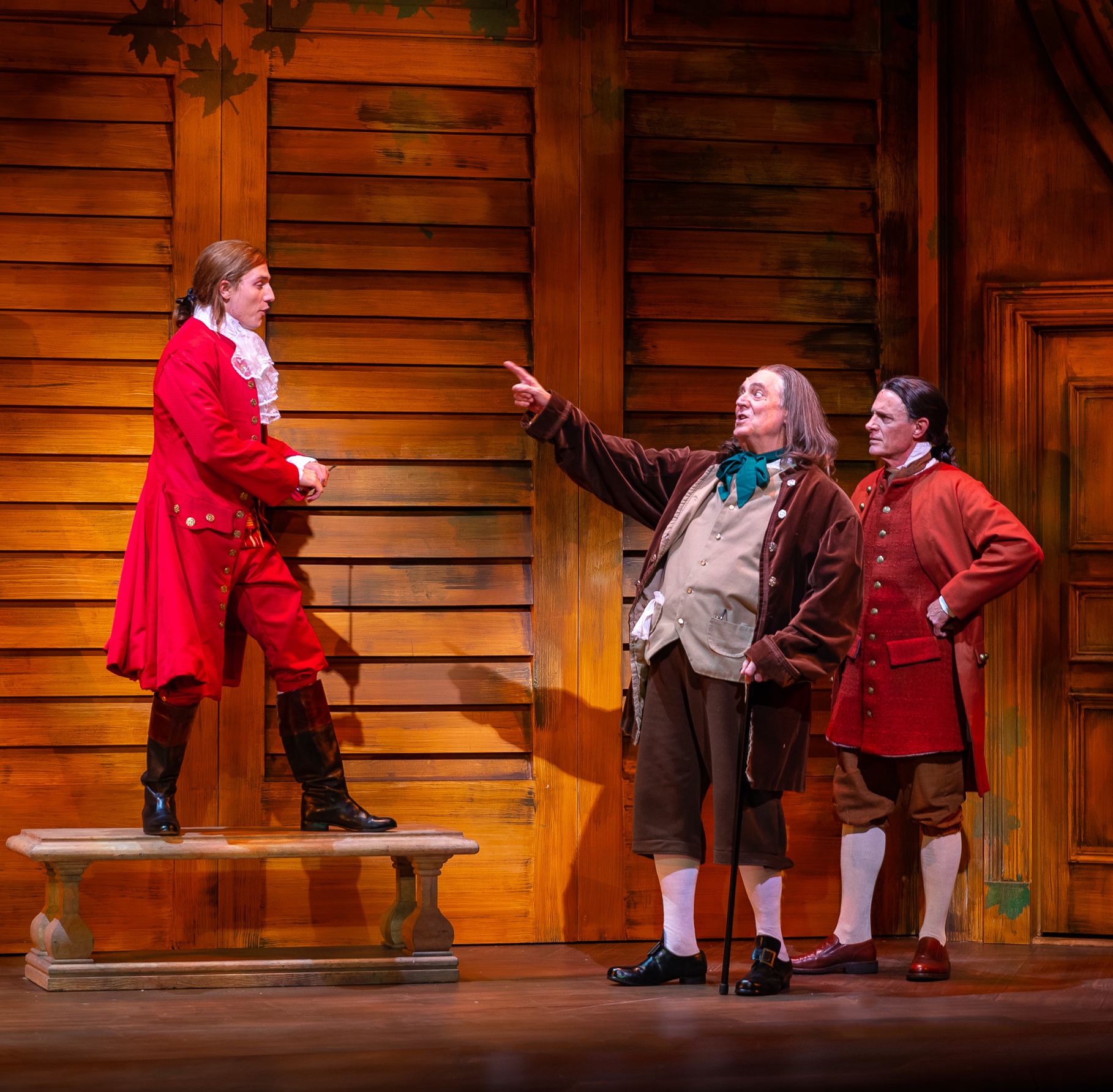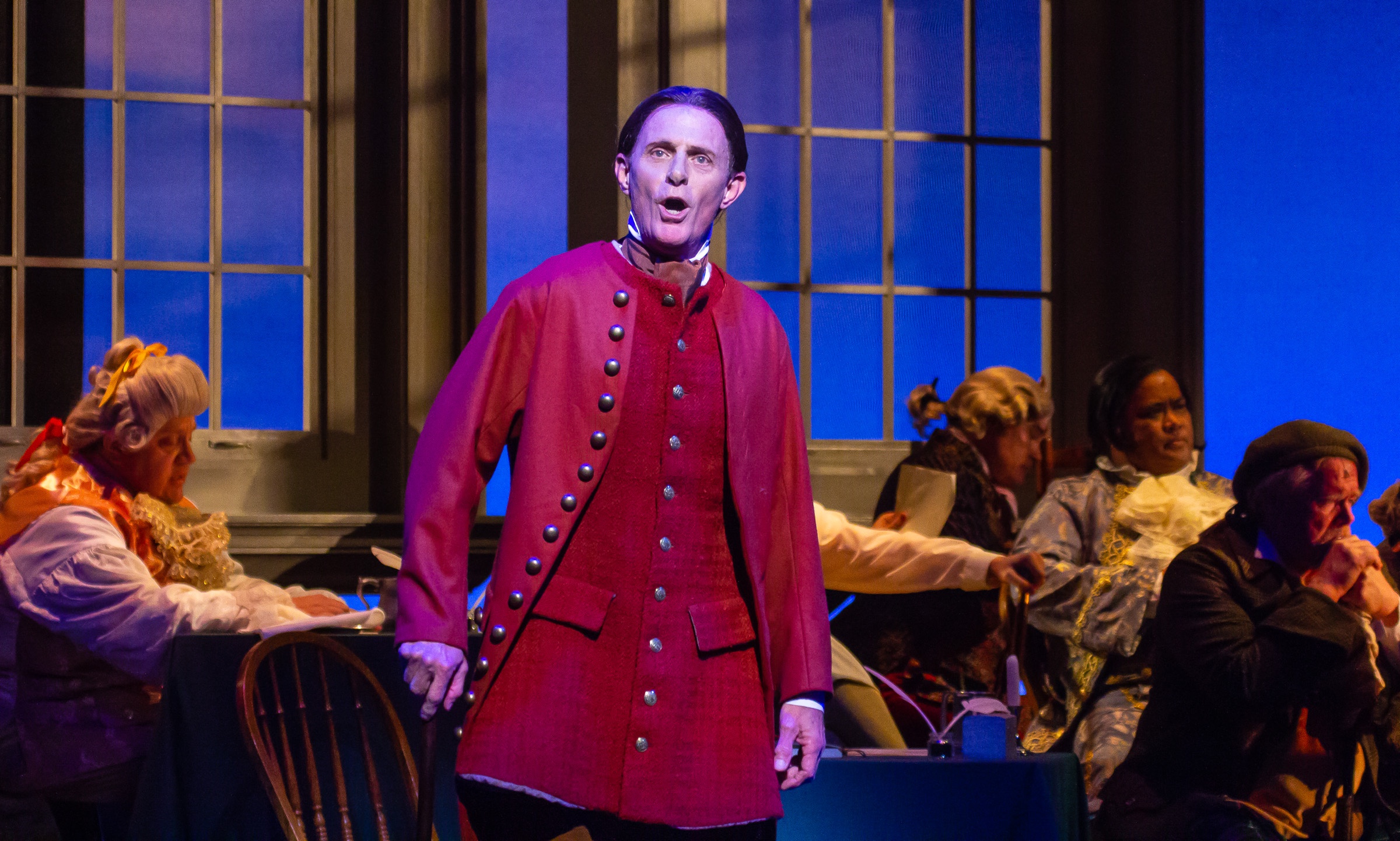I hold this truth to be self-evident: That all plays are NOT created equal. I’ve reviewed around 10 shows at La Mirada Theatre for the Performing Arts and its revival of the 1969 Tony Award-winning Broadway musical 1776 is probably the best play I’ve ever seen there. Not only owing to pleasurable songs composed by Sherman Edwards (accompanied at the La Mirada by a live eight piece orchestra conducted by Jeff Rizzo), along with enjoyable acting, but because it is a rarity from the Great White Way: A historical, fact-based musical explicitly about U.S. politics, insurrection and philosophy.
My Dad, a Civil Rights and antiwar advocate, and I had a recurring theme we discussed throughout his life: Why have so few movies and TV shows been made about the American Revolution? After all, this is the heady stuff of high drama, full of the great characters, conflict and action Hollywood thrives on. Whenever one of the handful of films about the War of Independence - such as John Ford’s 1939 Drums Along the Mohawk with Henry Fonda or the 1959 adaptation of George Barnard Shaw’s The Devil’s Disciple starring Burt Lancaster, Kirk Douglas and Laurence Olivier (guess who played British General John Burgoyne?) - aired on the tube or then-new features - such Al Pacino’s 1985 Revolution and Mel Gibson’s 2000 The Patriot - were theatrically released, we’d sound the alarm that, as Paul Revere put it: “The British are coming!” and watch them.
But these productions were few and far between. My theory explaining this is that the powers-that-be don’t want to remind the American people about their revolutionary history and heritage. After all, a case could be made that Thomas Paine (who’s almost completely missing in action from feature films, although there’s a 2016 TV movie version of Ian Ruskin’s one man show about the Common Sense author), Sons of Liberty founder Sam Adams, Thomas Jefferson, Ben Franklin, et al, were to the 18th century what Trotsky, Lenin, Che Guevara, etc., were to the 20th century. Movie moguls and assorted other imperialists and capitalists might not want to give the masses any bright ideas with movies and TV shows extolling the virtues of overthrowing despotic governments, the rights of man and so on.
1776 was adapted by Tinseltown - 1972’s screen version was faithful to the Broadway musical (the scripts for both were penned by Peter Stone). Unfortunately the 2 hour, 21 minute motion picture fell flat and is mediocre. In seeing La Mirada Theatre for the Performing Arts’ revival I understood the reason why: 1776’s action mainly takes place inside of Philadelphia’s Independence Hall (from choo-choo to chamber, the set of scenic designer Stephen Gifford, who outdid himself with La Mirada’s recent Murder on the Orient Express, again shines). The story mostly depicts the Second Continental Congress’ deliberations as it grappled with the weighty question of whether or not the 13 colonies should resist by force of arms the British Empire’s tyranny.
Onscreen this came across as talky, with spatially confined mise-en-
scène - but onstage, back on the boards where it belongs, 1776 works admirably well under Glenn Casale’s deft direction. From cracking audiences up with characters such as Richard Henry Lee’s (Michael Starr) puns and Franklin’s (Peter Van Norden) quips to crackling with tension as John Adams (Andy Umberger) debates the merits of declaring independence with recalcitrant legislators like John Dickinson (Michael Stone Forrest) to delightful dancing (also choreographed by Casale, who received a Tony nom for another revival, Peter Pan); etc. And kudos to costume designer Shon LeBlanc and wig designer Eb Bohks for their period panache that helps bring the 18th century ambiance alive.
Set more than a year after the immortal “shot heard ’round the world” was fired at Lexington and Concord, the floundering Founding Fathers try to chart a course in the tricky, turbulent, unprecedented waters their tentative ship of state is setting sail on. To revolt, or not to revolt, that is the question? the Hamlet-like Continental Congress argues. As such, along with plenty of singing and dancing, 1776 is - like a Shaw or Bertolt Brecht production - a play about ideas.
Most of the songs by Sherman Edwards (who also composed the music for the 1959 hit song “See You In September”) have lilting melodies, but some possess lyrics that are politically resonant in a Kurt Weill kind of way. For instance, in Act I Dickinson and the Conservatives croon the song "Cool, Cool, Considerate Men", making the case that white male property holders should rule the new nation being born, singing:
“Come ye cool, cool conservative men
Our like may never ever been seen again
We have land, cash in hand
Self command, future planned
Fortune thrives, society survives
In neatly ordered lives
With well-endowered wives…
“To the right, ever to the right
Never to the left, forever to the right
“Where there's gold
A market that will hold
Tradition that is old
Reluctant to be bold…”
Sung by Edward Rutledge (Broadway veteran James Barbour), Act II’s “Molasses to Rum” is even more scathing, as the South Carolina planter threatens to thwart the Congress’ pending vote on whether or not to break once and all with Great Britain (which, according to the play, requires unanimity), unless an anti-slavery clause is withdrawn from the Declaration of Independence. The scene stealing Barbour - who played the title role in The Phantom of the Opera on the Great White Way and won an Ovation Award for depicting Jean Valjean in Les Miserables, also at La Mirada Theatre - almost steals the entire show with his earth shattering rendition of “Molasses to Rum.” Ignited by Barbour’s booming baritone, his number is arguably the play’s most powerful, if not the best song. No offense to Barbour - who alone is worth the price of admission - it’s sad to report that what may well be 1776’s most compelling song is, sadly, in defense of slavery (although the point must be made that the play itself is definitely not).
The musical’s sharpest politics and dialogue deals with the USA’s original (and cardinal) sin: the thorny issue of America’s enslaved people. To his credit Adams notes that the colonies’ Africans should not be subjected to the same subjugation that their white settler brethren were resisting in their own fight against the tyrannical King George. Rutledge throws the subject of slavery right back into the face of Jefferson, the lord of Monticello who wrote the very passage that his fellow Southern aristocrat finds to be so offensive.
Jefferson protests that he plans to free his own slaves - and like much of 1776 I wondered how historically accurate this was? (To read a recent splendid LA Times op-ed by Jefferson’s L.A.-based great-great-(manytimes removed) granddaughter Evelia Jones, see: https://www.latimes.com/opinion/op-ed/la-oe-jones-sally-hemings-first-lady-20190104-story.html.) Certainly, Franklin’s summoning of Jefferson’s wife from Monticello so he could overcome his writer’s block and finish writing the Declaration by having sex with Martha (played by the voluptuous Ellie Wyman, her character is erroneously referred to in the program as Martha Washington - instead of Jefferson - in a hilarious typo) is historically inaccurate, as in reality she did not make the journey up to Philadelphia during this period. Along with Teri Bibb - who, as Abigail Adams, performs lovely duets with husband John that illustrate their prolific correspondence - Wyman has the only female role: It seems that Stone and Edwards forgot Abigail’s real life admonition to her husband: “Don’t forget the ladies.” In any case, our Founding Mothers and Fathers’ romances are inspiring.
As is this grand production of 1776, which, after all, is a dramatization that takes dramatic license - and not a history lesson per se. (There was no C-SPAN covering the Continental Congress, nor were there contemporaneous written records, so the playwright embroidered history to some extent.) Embroiled as we currently are in Congressional disputes, contemporary audiences will be amused to see the Second Continental Congress’ bickering.
But today we may ponder what, so to speak, the “third act” of 1776 will be, as the Trump presidency threatens to return our republic to the same autocratic despotism that our Founders fought against. This is a history yet to be written - by all of the American people, despite ethnicity, religion, class or gender, as all Americans plus the immigrants and refugees among us, struggle to secure the rights and liberties promised by the anti-monarchist revolution of 1776 to EVERY ONE OF US - not just white, male, property owners. Watch for the spectacularly beautiful way this stirring, must-see production of 1776 ends - literally, poetry in motion.
Following the La Mirada Theatre engagement, 1776 THE MUSICAL transfers to the Younes and Soraya Nazarian Center for the Performing Arts (The Soraya) at CSUN for four performances Friday, February 8 through Sunday, February 10.
FUN FACT OF THE REVIEW:
In the 1972 movie version of 1776 Ben Franklin was portrayed by Howard Da Silva - who, during the 1950s was a blacklisted actor. Much to his eternal credit, Da Silva - who co-starred in Paul Robeson’s last American movie, 1942’s Native Land - refused to be an informer and delivered some of the most withering testimony to the would-be King Georges of the House Un-American Activities Committee that Franklin would have been proud of.
1776 is being performed 7:30 pm on Wednesdays and Thursdays; 8:00 p.m. on Fridays; 2:00 p.m. and 8:00 p.m. on Saturdays; and 2:00 p.m. on Sundays through Feb. 3 at La Mirada Theatre for the Performing Arts, 14900 La Mirada Blvd., La Mirada, CA. For info see: www.lamiradatheatre.com or call: (562)944-9801 or (714)994-6310.
L.A.-based reviewer Ed Rampell co-authored “The Hawaii Movie and Television Book.” (See: https://mutualpublishing.com/product/the-hawaii-movie-and-television-book/.)





